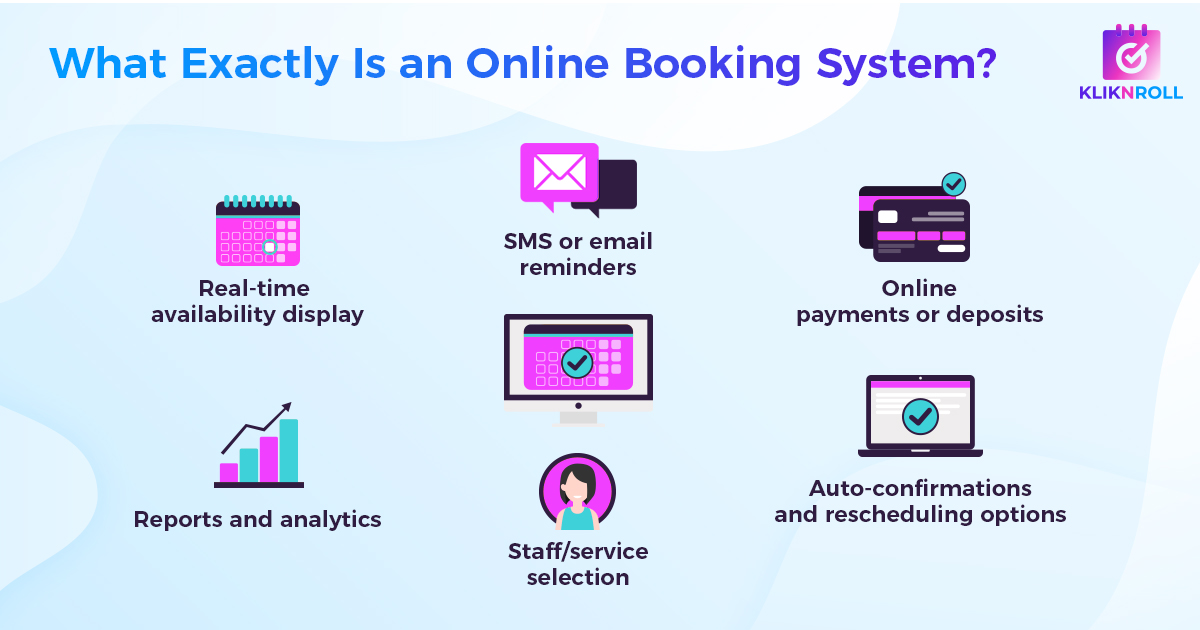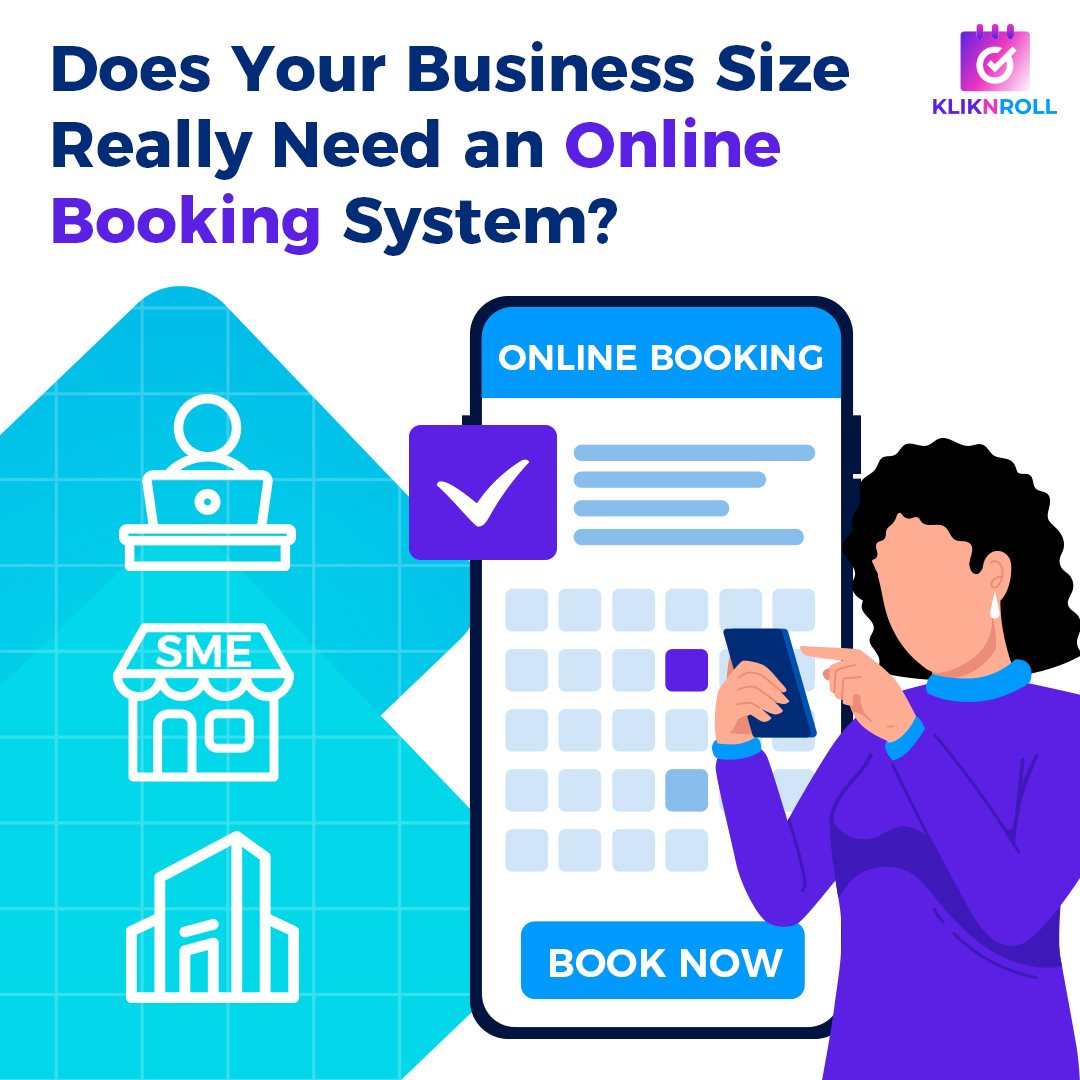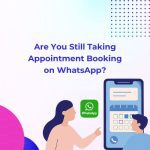Table of Contents
In today’s digital-first world, online booking has become the norm in many industries. Customers expect the convenience of scheduling appointments at their own time. But if you’re a business owner or operations manager, you may still be asking: Does our business size really need an online booking system?
It’s a fair question. Maybe you only have a few staff, or you think your customers prefer calling in. This guide is here to help you unpack the real benefits, the trade-offs, and how to decide if online booking is a smart move, whether you’re a one-person show or running multiple locations.
What Exactly Is an Online Booking System?

Before diving into whether you need one, let’s make sure we’re clear on what is an online booking system.
An online booking system allows customers to schedule appointments through your website, social media, or a unique booking link, without needing to call or message you directly. But that’s just the surface.
Most systems today also include:
- Real-time availability display
- SMS or email reminders
- Online payments or deposits
- Auto-confirmations and rescheduling options
- Staff/service selection
- Reports and analytics
Some even integrate with your calendar, POS, CRM, or marketing tools. Whether you’re running a hair salon, consulting firm, repair service, or a medical clinic, the same principles apply.
What Problems Does It Actually Solve?
This is the core question. If you’re not experiencing any pain points, maybe you don’t need it. But let’s walk through the real-life issues many businesses face, ones that booking systems directly address:
1. Missed Bookings Due to Missed Calls
You’re closed. Your customer isn’t. They try to book at 10PM. No one picks up. They move on to a competitor who offers online booking.
Why It Matters:
Today’s customers expect 24/7 accessibility, not because they want service at 3AM, but because they want the freedom to book whenever it’s convenient. If you’re relying solely on phone calls, social DMs, or WhatsApp replies, you’re likely missing bookings when you’re not actively monitoring.
Real Example:
A small home massage service in Selangor reported that after adding a booking widget on their website, 40% of new bookings came in outside working hours, bookings they were previously missing entirely.
2. Wasted Time on Admin
Your team spends hours each week replying to booking requests, double-confirming via chat, adjusting calendar slots manually, and chasing clients for confirmations.
Why It Matters:
Every hour spent on admin is an hour not spent on revenue-generating work, whether it’s serving customers, closing deals, or optimizing operations.
What Online Booking Solves:
- Customers self-schedule into open slots
- Real-time availability eliminates back-and-forth
- Reschedules/cancellations handled with one click
- Automated confirmations reduce need for manual follow-up
3. Double-Bookings or No-Shows
Problem:
Staff take bookings over phone, while another accepts via DM, and another over WhatsApp, all on different devices. Result?
Two customers show up at the same time. You lose trust with both.
Why It Matters:
Inconsistent booking channels create friction. Without a central source of truth, businesses risk not only confusion but damaged reputations.
What Online Booking Solves:
- A unified calendar
- Prevents overlaps automatically
- Optional buffer times between appointments
- Assigns appointments to specific team members
4. Limited Working Hours
Online booking systems work 24/7. That means your business is taking appointments while you sleep. Especially useful for freelancers or solo businesses that can’t respond instantly.
5. No Insights to Plan Better
With manual bookings, it’s hard to know which service is most in-demand, when your peak hours are, or how often clients return. Online systems give you all this data.
Do All Business Sizes Need It? Let’s Break It Down
a. Solo Entrepreneurs or Freelancers
Let’s say you’re a home masseur, consultant, tutor, or makeup artist. You do everything: marketing, sales, scheduling, and delivery.
Without online booking: You lose time replying to inquiries, miss bookings when you’re busy, and risk appointment confusion.
With online booking: Clients can schedule anytime, and you get instant notifications. It’s like hiring a part-time assistant without the cost.
b. Small Teams (1–10 staff)
Whether you’re a small salon, repair service, or dental clinic, your front-desk or admin team is likely juggling many tasks.
Pain point: Managing bookings across WhatsApp, phone calls, and walk-ins is messy. And customers expect fast replies.
Booking system benefits: It reduces call volume, improves staff productivity, and allows customers to book based on availability.
c. Medium-Sized or Multi-Outlet Businesses
Now you’re running multiple teams or branches. Things get complex: shared calendars, customer data across outlets, and performance reporting.
Online booking solves:
- Centralized scheduling
- Staff and location management
Reporting on bookings, cancellations, peak hours
6 Signs Your Business Is Ready for an Online Booking System
Ask yourself:
- Are you (or your staff) spending more than 30 minutes/day on booking tasks?
- Are you missing bookings outside office hours?
- Are no-shows hurting your bottom line?
- Have customers asked to book online?
- Are you planning to grow or expand soon?
- Do you feel blind about customer behavior or appointment trends?
If you said “yes” to 2 or more, it’s time to seriously consider a system.
What Happens If You Don't Use One?
- You may lose customers to competitors who offer easier booking.
- Your staff will spend time on admin instead of high-impact work.
- Your scheduling remains prone to errors.
- You miss out on useful customer data.
- Scaling your operations becomes harder.
Businesses using booking systems saw up to 30% more repeat customers.
Common Objections (And Why They’re Outdated)
“We’re too small for that.”
Even solo business owners benefit. You save time, reduce no-shows, and get organized.
“Our customers prefer calling.”
Maybe a few do, but 70% prefer to book online. You can always offer both.
“It’s expensive.”
Free or low-cost options exist (e.g. Calendly, Setmore). Even saving 1 no-show per month can cover the cost.
“It’s too technical.”
Modern tools are easy to set up with drag-and-drop interfaces. Many offer onboarding help and templates.
Evaluation Checklist: Are You Ready?
- I often miss bookings when I can’t respond fast enough
- I’m losing time daily on appointment management
- I want to reduce no-shows
- My team is stretched managing bookings manually
- Customers want easier ways to book
- I need better visibility on service performance
If you ticked 3 or more, it’s worth exploring a solution.
How to Pick the Right Booking System
Not all booking systems are created equal, and choosing the right one should depend on your business model, operations, and future plans. Here’s how to evaluate what’s right for you, without getting overwhelmed by flashy features or confusing comparisons.
1. Match the Features to Your Workflow
Start with the basics. Ask yourself:
- Do I need individual bookings, group sessions, or both?
- Do customers need to choose staff, services, or locations?
- Will I need time slot controls, deposit options, or QR check-ins?
Make sure the system you’re considering can support these key flows, and preferably all in one place, without needing patchwork tools.
2. Think About Your Team’s Role
Who will manage the backend?
- If you’re a solo operator, look for something that’s lightweight and doesn’t require training.
- For teams, choose a system that lets multiple staff manage their own schedules, with access control, notifications, and visibility across branches (if needed).
Don’t just think about features, think about how your team will actually use it day to day.
3. Consider Future Growth, Not Just Today’s Needs
A system that only works when you’re small may slow you down as you scale. Instead, choose something that:
- Lets you add locations or services without reworking the whole setup
- Comes with reporting tools to track growth
- Can support seasonal campaigns, promo events, or loyalty integrations down the road
4. Look for Support That Supports You
Even the best systems come with learning curves. Make sure there’s solid customer support:
- Is there onboarding help?
- Can you reach a real person if you hit a snag?
- Do they understand your industry’s challenges?
Smooth support can be the difference between a successful rollout and a frustrating delay.
5. Go With a System That Understands Business, Not Just Tech
Some systems are built by developers. Others are built by people who’ve walked in your shoes, who understand scheduling pains, customer behaviors, and how to turn bookings into business results. Look for one that speaks your language and evolves with real business feedback, not just feature requests.
💡 Pro Tip: If you’re considering online booking but unsure where to start, begin by mapping your current process. Where do delays happen? Where do you lose customers? A good system should fix those points first, and make your life easier, not more complicated.
Conclusion: It’s Not About Size, It’s About Solving the Right Problems
Online booking systems aren’t just for big companies or high-tech teams. They’re for any business that wants to run smoother, serve customers better, and grow with less friction.
Whether you’re managing appointments, events, or high-volume orders, the key question is:
“Is my current way of handling bookings helping me grow, or holding me back?”
If you’ve recognized some of the challenges we covered, missed bookings, manual scheduling, no-shows, or scattered data, it might be time to explore a more structured approach.
👉 KlikNRoll has helped businesses of all sizes, from retail chains to solo brands, improve the way they manage bookings, events, and customer flows.
You don’t have to decide now. But if and when you’re ready to explore how a flexible system could support your goals, KlikNRoll is a great place to start.

Hey there! I’m Jeffrey Hau, and my journey in the digital world started after I wrapped up my psychology degree at UCLA. Imagine coming back to the bustling streets of Hong Kong from the tech haven of Silicon Valley – it was a whirlwind of inspiration! Seeing how social media platforms were evolving at breakneck speed and realizing the limitations of traditional advertising in this digital age, I decided to dive in.
In 2012, I laid the foundation of Prizm Group. From our humble beginnings, we’ve now blossomed into a global powerhouse with a team of over 200 passionate professionals. Our HQ is right here in Hong Kong, and we’ve spread our wings to SG, AU, NZ, JP, and China.
As a digital problem solver, our team found that several industries are in need of reservation systems, especially for F&B, Hotels, Beauty, and Medical sectors. Our digital magicians started crafting reservation systems tailored to cater to these specific needs. We extended our expertise to e-commerce, voucher management systems, and campaign management systems, combining them into KlikNRoll – an all-in-one solution. We deep dive into various industries, understanding their unique challenges and developing innovative solutions.
We’re not just a company; we’re your dedicated partners in transforming how you navigate the digital landscape. Our passion lies in providing businesses with intuitive and tailored solutions using KlikNRoll’s powerful capabilities.
Ready to embark on this exciting digital adventure with us? Let’s make your brand stand out in the digital jungle!







